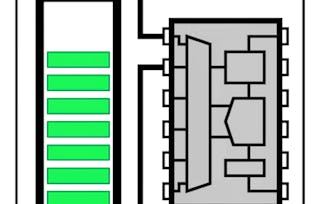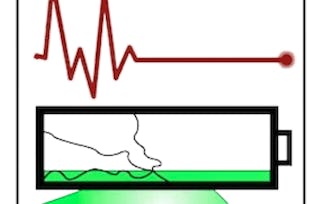This course can also be taken for academic credit as ECEA 5734, part of CU Boulder’s Master of Science in Electrical Engineering degree.


Battery Pack Balancing and Power Estimation


Battery Pack Balancing and Power Estimation
This course is part of Algorithms for Battery Management Systems Specialization

Instructor: Gregory Plett
12,709 already enrolled
Included with
105 reviews
What you'll learn
How to design balancers and power-limits estimators for lithium-ion battery packs
Skills you'll gain
Details to know

Add to your LinkedIn profile
1 quiz, 28 assignments
See how employees at top companies are mastering in-demand skills

Build your subject-matter expertise
- Learn new concepts from industry experts
- Gain a foundational understanding of a subject or tool
- Develop job-relevant skills with hands-on projects
- Earn a shareable career certificate

There are 6 modules in this course
In previous courses, you learned how to write algorithms to satisfy the estimation requirements of a battery management system. Now, you will learn how to write algorithms for two primary control tasks: balancing and power-limits computations. This week, you will learn why battery packs naturally become unbalanced, some balancing strategies, and how passive circuits can be used to balance battery packs.
What's included
7 videos15 readings6 assignments1 discussion prompt
Passive balancing can be effective, but wastes energy. Active balancing methods attempt to conserve energy and have other advantages as well. This week, you will learn about active-balancing circuitry and methods, and will learn how to write Octave code to determine how quickly a battery pack can become out of balance. This is useful for determining the dominant factors leading to imbalance, and for estimating how quickly the pack must be balanced to maintain it in proper operational condition.
What's included
6 videos6 readings6 assignments1 ungraded lab
This week, we begin by reviewing the HPPC power-limit method from course 1. Then, you will learn how to extend the method to satisfy limits on SOC, load power, and electronics current. You will learn how to implement the power-limits computation methods in Octave code, and will see results for a representative scenario.
What's included
5 videos5 readings5 assignments1 ungraded lab
The HPPC method, even as extended last week, makes some simplifying assumptions that are not met in practice. This week, we explore a more accurate method that uses full state information from an xKF as its input, along with a full ESC cell model to find power limits. You will learn how to implement this method in Octave code and will compare its computations to those from the HPPC method you learned about last week.
What's included
6 videos6 readings1 quiz5 assignments3 ungraded labs
Present-day BMS algorithms primarily use equivalent-circuit models as a basis for estimating state-of-charge, state-of-health, power limits, and so forth. These models are not able to describe directly the physical processes internal to the cell. But, it is exactly these processes that are precursors to cell degradation and failure. This week quickly introduces some concepts that might motivate future BMS algorithms that use physics-based models instead.
What's included
6 videos6 readings6 assignments4 ungraded labs
This capstone project explores the design of resistor value for a switched-resistor passive balancing system as well as enhancing a power-limits method based on the HPPC approach.
What's included
2 programming assignments2 ungraded labs
Earn a career certificate
Add this credential to your LinkedIn profile, resume, or CV. Share it on social media and in your performance review.
Build toward a degree
This course is part of the following degree program(s) offered by University of Colorado Boulder. If you are admitted and enroll, your completed coursework may count toward your degree learning and your progress can transfer with you.¹
Instructor

Explore more from Electrical Engineering
 Status: Free Trial
Status: Free TrialUniversity of Colorado Boulder
 Status: Free Trial
Status: Free TrialUniversity of Colorado Boulder
 Status: Free Trial
Status: Free TrialUniversity of Colorado Boulder
 Status: Free Trial
Status: Free TrialUniversity of Colorado Boulder
Why people choose Coursera for their career

Felipe M.

Jennifer J.

Larry W.

Chaitanya A.
Learner reviews
- 5 stars
91.42%
- 4 stars
6.66%
- 3 stars
0.95%
- 2 stars
0%
- 1 star
0.95%
Showing 3 of 105
Reviewed on Jul 20, 2023
Great content focusing on important aspects of the subject. It completes the rest of the courses in the specilization, and lays a good knowledge foundation on the subject.
Reviewed on Jan 24, 2023
This is a superb course and specialization. A big thanks to Prof Gregory and the rest of the team that made it happen.
Reviewed on Aug 1, 2020
It is an excellent course for battery enthusiasts.

Open new doors with Coursera Plus
Unlimited access to 10,000+ world-class courses, hands-on projects, and job-ready certificate programs - all included in your subscription
Advance your career with an online degree
Earn a degree from world-class universities - 100% online
Join over 3,400 global companies that choose Coursera for Business
Upskill your employees to excel in the digital economy
Frequently asked questions
To access the course materials, assignments and to earn a Certificate, you will need to purchase the Certificate experience when you enroll in a course. You can try a Free Trial instead, or apply for Financial Aid. The course may offer 'Full Course, No Certificate' instead. This option lets you see all course materials, submit required assessments, and get a final grade. This also means that you will not be able to purchase a Certificate experience.
When you enroll in the course, you get access to all of the courses in the Specialization, and you earn a certificate when you complete the work. Your electronic Certificate will be added to your Accomplishments page - from there, you can print your Certificate or add it to your LinkedIn profile.
Yes. In select learning programs, you can apply for financial aid or a scholarship if you can’t afford the enrollment fee. If fin aid or scholarship is available for your learning program selection, you’ll find a link to apply on the description page.
More questions
Financial aid available,



